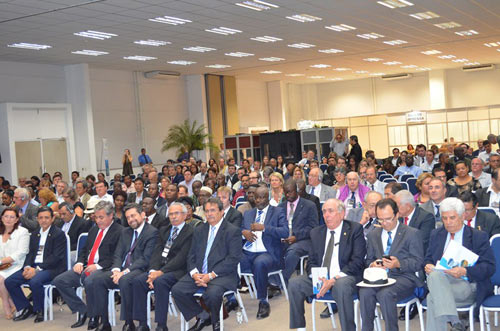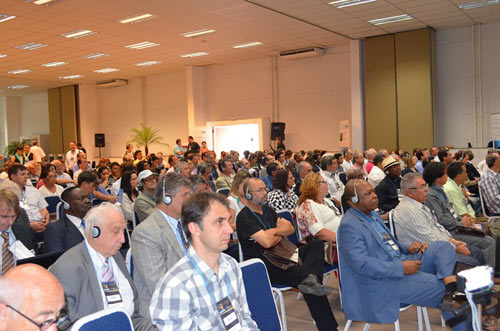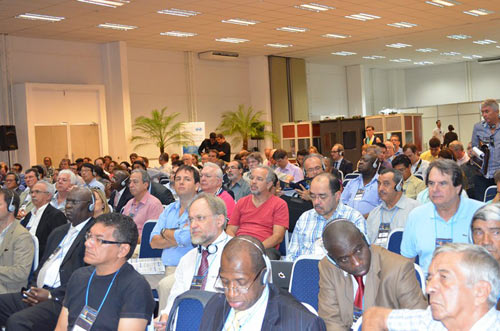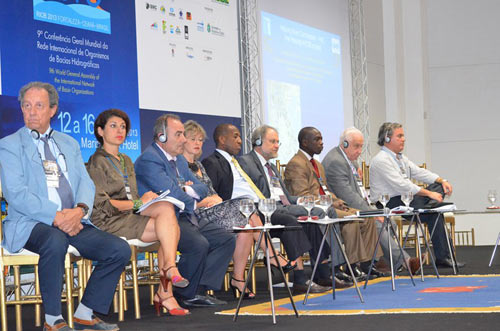9th WORLD GENERAL ASSEMBLY
OF THE INTERNATIONAL NETWORK OF BASIN ORGANIZATIONS
"BETTER WATER MANAGEMENT AT RIVER BASIN LEVEL TO FACE THE LARGE WORLD CHALLENGES"
13-16 August, 2013 Fortaleza-Seara, Brazil
The International Network of Basin Organizations (INBO) was established in 1992 with the support of the Government of France and currently covers more than 200 organizations from 49 countries. The Permanent Technical Secretariat (PTS) of INBO is in Paris, the unchallenged Executive Secretary is Mr. Jean-Francois Donzier. The governing body is the Liaison Bureau, which is elected for 3 years and consists of three representatives from all regional organizations.
INBO is supported by 8 regional networks: the Group of European Basin Organizations (EUROPE-INBO), the Network of Russian-speaking Basin Organizations of Eastern Europe, Caucasus and Central Asia (EECCA-NBO), the Mediterranean Network of Basin Organizations (MENBO), the new North-American Network of Basin Organizations (NANBO), the Latin- American Network of Basin Organizations (LANBO), the Central and Eastern European Network of Basin Organizations (CEENBO), the Brazilian Network of Basin Organizations (REBOB).
The Assembly was jointly organized by the INBO PTS, REBOB Secretariat and the Organization for the Development of the Senegal River, which High Commissioner H.E., Mr. Mohamed Salem Ould Merzoug, is the President-in-Office of the INBO.
The Assembly followed the Liaison Bureau Meeting, where the progress report of the Executive Secretary, the financial report as well as the supposed Plan of Activities for the period to 2015 were heard.
The official opening of the Assembly took place on August 13, and the welcoming addresses of the President of the National Water Agency (ÀÍÀ) of Brazil, the President-in-Office, as well as presidents of all the regional networks were heard. Prof. Dukhovny V.A. read out the welcoming address on behalf of Academician P. Polad-Zade, President of EECCA-NBO.
The morning meeting on August 14 started with the report “Water security in the world” of Prof. Benedito Braga, President of the World Water Council. It voiced concerns for various readiness degrees of countries and basins in the world to growing water crisis. Ethiopia and Australia, Nepal and USA are located in similar geographic conditions, but degrees of their provision with infrastructure and their levels of resources management distinguish critically. In some countries, the situation with water security systems, which are often beyond the government view, is even worse. Well-known that it is water security that determines productive, energy and social security, particularly in countries with a higher share of rural population. To this end, both governments and the public should pay their attention to water governance, creation and development of water potential, and this, in turn, as feedback, will impact sustainability of the natural complex. Mr. Benedito Braga paid a special attention to the problem of reservoirs. He strongly objected to popular belief that “dams create the dirty world”. The example of successful functioning of hydroengineering complexes is the largest hydroscheme Bkhakra Nangal in India, which irrigates 7 mln ha in several states and produces 2800 bln kW-hour of electric power. The problem is rooted not in dams but in skills at their management for the benefit of the whole basin, particularly taking into account interests of nature and agriculture. The main condition is availability of the political will of leaders from neighbouring countries and provinces. As a positive factor in global development of water management, the rapporteur mentioned strengthening MFO’s attention to significance of the water factor, and that had an effect on the growth of investments in water management, irrigated agriculture and hydropower industry starting since 2004.
The report on a state of water resources management and use in Brazil was delivered by Mr. Vicente Andreu Guillo, President of the National Water Agency (ANA) of Brazil. Water management in the country is a prerogative of the Federal Government that directly governs 12 river basins, which drastically distinguish with their high water content. Along with the Amazon River basin of very high water content, there are basins of extremely limited water contents, for instant the North-East Atlantic. 200 basin committees for rivers and tributaries, small sources function within the basins, where planning of development and management policy is the main tool for them. At that, the Government affords ample scope to decentralized administrations, while counting on global involvement of all stakeholders. Local bodies consider social mobilization of water users and different interested entities as their main commitment. At the same time, the weakness of the committees is lack of well-prepared staff, as well as insufficient provision of facilities and mechanisms.
The Assembly heard the report for 2010-2012 of Mr. Donzier, the Executive Secretary, and that of the Statutory Auditor, a presentation of the Director for Communication and Publication, as well as those of all regional networks.
Further discussions were hold in form of round tables on the following issues:
- Adaptation to the effects of climate change and prevention of extreme phenomena of floods and droughts.
- Participation of local authorities, water users and the public, role of the basin committees.
- Management of transboundary rivers, lakes and aquifers.
- Financing of water management and of basin organizations
The results of the discussions provided the basis of the Assembly Declaration of Fortaleza.
At the “Transboundary waters” panel, Dr. Vadim Sokolov clearly emphasized the role of observance of UN 1992 and 1997 Water Conventions by all the neighboring countries. He provided examples of when non-observance of the Conventions damages much the neighboring countries by the example of the Syrdarya River. At that, he underlined harmfulness of tendencies for establishment of new regional Conventions and critical necessity for general accession to the UN 1992 and 1997 Conventions, and ensuring of public support and control of observance of regulations in these documents. He condemned the aspiration of some countries within the upper catchments not to accede to these Conventions but draw up a special regional convention. Simultaneously, the following example provided by the Minister of Botswana is of interest: having acceded to the UN Convention, all the countries within one basin specified the tying its principles to their basin conditions through signing of a special protocol for application of the Convention.
The panel discussion on financial issues showed complexity of their solutions in the global practice and rather various approaches. In Brazil, for instant, the greatest contribution to financing of the basin organizations is given by HPPs, which receive most income from water use. Water supply and irrigation use cross subsidies, which amounts are approved by the Parliament. In Lesotho, hydropower companies allot 50% of their profits to water management. In France, all water users pay single-rate charges for water as a resource regardless of a consuming sector. In France, as well as in the whole Europe, “polluter-pays” (charges for pollution) present the most complexity because of difficulty in identifying who and in what extent pollutes a watercourse. The way out is to establish “polluter-pays” by municipalities, within areas of which pollution takes place, and thus, a source of and a person responsible for pollution are identified by municipalities within their mandates. Italian regulations are oriented to preventive construction of treatment, erosion-preventive and collector-drainage facilities with use of public contributions proportionally to water amount used. Those contributions include funds for protective belts and forest plantation. In Argentina, financing of expenditures for water management is regulated based on needs as primary ones by the Parliament, which clearly regulates allocation of contributions between different sector ministries, municipalities and water users themselves, while supervising implementation of this system. Central and South Africa is characterized with big problems with financing of expenditures for water management, and therefore putting an effect on a state of waterworks facilities and the situation with water use. Here, a burden of water supply bears mainly on donors.
On August 15, the final meeting was hold where the INBO World Presidency was transferred from Senegal to Brazil. Mr. Lupercio Ziroldo Antonio was elected as the INBO World President for the following three years. The General Assembly also approved the “Declaration of Fortaleza”.




The foundation of the “Declaration of Fortaleza”
1. Floods, droughts, water-borne diseases, pollution, wastage and destruction of aquatic ecosystems: in many countries in the world, the seriousness of the situation requires the implementation of a comprehensive, consistent and integrated water resources management, focusing on upstream and downstream solidarity between all countries and all users.
2. IWRM at basin level is important for everyone. Water does not have administrative and national boundaries. Though the first experiments in integrated river basin management were carried out more than fifty years ago and have many advantages, although all the problems cannot be solved overnight.
3. At first, basin management should be based on integrated information systems, knowledge hub on resources and their uses, needs, polluting pressures, risk management, definition of short- and long-term forecasts. They should be impartially accessible to all users, equally as water managers and decision-makers.
4. Basin management plans or master plans and schemes for Complex Water Resources Use and Conservation, development measures, established through dialogue with all the stakeholders, should identify boundaries and time-frames for implementing different measures on development, including required amount of capital investments. As the experience of the European countries shows, these plans should include all water types, take particularly into account the effects of climate change, need for restoration the hydro-morphology of rivers, including restoration of wetlands, migratory fishways, as well as future buffer grass and forested strips along watercourses, etc ...
5. Conditions of financing of water resources management and the water organizations development must be guaranteed regarding combined state and private investments, tariff systems and the application of the “polluter pays” principles, taking into account cross-sectoral subsidies among all categories of users.
6. Active participation in decision-making of the local authorities concerned, including municipalities, representatives of different categories of users and associations for environmental protection or of public interest should be organized and combined with decisions at governmental, regional and local levels.
|